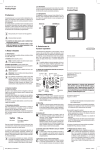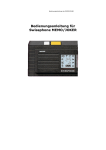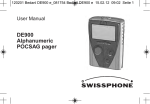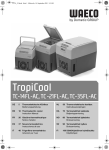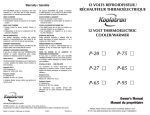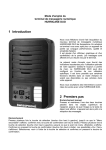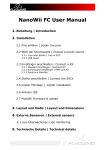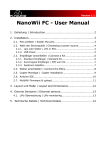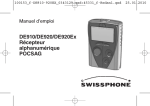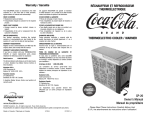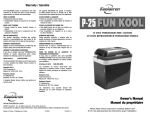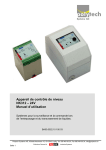Download (A)LGRA Expert
Transcript
1302404 BA (A)LGRA-0343235_120752_(A)LGRA-0343235 31.10.13 13:53 Seite 8 Reconnaissance pile/accumulateur Agencement des contacts relais pour l’(A)LGRA Expert Après la mise en place d’une cellule (pile sèche ou accu), l’identification de la cellule ainsi que la procédure d’enclenchement du récepteur débutent. Un bip retentit lorsque ce processus est terminé. Si la nouvelle cellule placée est fortement déchargée, le récepteur ne peut identifier immédiatement s’il s’agit d’une pile sèche ou d’un accu. Le récepteur part du principe que la cellule nouvellement placée est un accu. Le processus de recharge est donc automatiquement lancé. Ensuite, le chargeur mesure la tension de la cellule. Une fois la tension de seuil atteinte, l’identification de la cellule et la procédure d’enclenchement du récepteur sont activées. La cellule est identifiée et l’information correspondante mémorisée par le récepteur. S’il s’agit d’un accu, la recharge se poursuit. En cas de pile sèche, le recharge est interrompue. Jusqu’à ce que l’identification est achevée, il peut s’écouler jusqu’à dix minutes. Pendant ce temps, la cellule est rechargée. Il y a un contact libre de potentiel entre les broches 1 et 3 du connecteur DIN. La puissance de coupure du contact est 30 V, 1 A AC/30 V, 1 A DC. Veuillez noter qu’aucune plaquette n’est apposée sur l’(A)LGRA pour présenter l’agencement des contacts. Quelques types de récepteurs vous permettent le choix manuel «accu/pile sèche». Pour toute information détaillée, veuillez vous référer à la documentation de produit du récepteur. REL 41 30 V, 1 A AC 30 V, 1 A DC 3 1 5 2 4 5VDC mA) (4 – 7(max. VDC /400 25 mA) Après une panne de courant, le contact relais se ferme si tous les messages du récepteur n’ont pas été quittancés. Lorsque le récepteur placé dans le chargeur reçoit un message pendant une panne de courant, le contact est activé dès le rétablissement du courant électrique. Remarques Ce chargeur est approprié pour les sources d’alimentation recommandées. Il comporte une protection de charge pour les piles sèches. Veuillez respecter les valeurs de raccordement indiquées pour le connecteur DIN. Le chargeur ne doit être utilisé que dans des locaux secs. L’appareil répond aux dispositions des directives européennes R&TTE 99/05/EG (pour installations radio et équipements de télécommunication). Vous pouvez obtenir une copie de la déclaration de conformité à l’adresse suivante: [email protected]. English Rear view BNC aerial socket Connection socket Chargers The receivers rechargeable power sources (NiMH) can be charged using one of the various Swissphone chargers. They are available for operation with the mains (LGRA Expert) and in-car cigarette lighters (ALGRA Expert). Both models have an isolated relay contact and a BNC aerial socket. The chargers LED (green/orange) shows the status of the rechargeable battery. The call LED indicates when a call comes in. The relay contact is activated at the same time as the call LED. Front view Call LED Charge LED green/orange Charging procedure for (A)LGRA Expert Please insert the receiver carefully into the (A)LGRA Expert first – the charge LED should then show green or orange. A red flashing charge LED indicates a contact failure between receiver and charger. Please remove the receiver from the charger and re-insert. Meaning of LED charging colours Charge LED does not light up: no contact between receiver and charger Charge LED lights up red: contact failure (GND not contacted) Battery/rechargeable battery recognition Relay contact configuration for the (A)LGRA Expert After a battery/rechargeable battery has been inserted, the battery recognition and receiver start-up procedure begins. You will hear a beep when the procedure ends. If a newly inserted battery is very weak, the receiver will not recognize immediately whether a dry cell or rechargeable battery has been inserted. The receiver will assume that a rechargeable battery has been inserted and charging will start automatically. The receiver will then measure the battery voltage. When the threshold voltage has been reached, the battery recognition and receiver start-up procedure is activated. The battery is recognized and the relevant information is stored in the receiver. If a rechargeable battery has been inserted, charging will continue. If it is a dry cell battery, charging will stop. The recognition can take up to ten minutes. During this time the battery will be charged. There is an isolated relay contact to audio socket pins one and three. The switching capacity at the socket is: 30 V, 1 A AC/30 V, 1 A DC. Please note that there is no plate on the (A)LGRA to show the relay contact configuration. Some types of receiver offer manual selection of “Rechargeable/dry cell battery”. Please refer to the receiver manual for further information. (A)LGRA Expert REL 41 30 V, 1 A AC 30 V, 1 A DC 3 Ladegerät Chargeur Charger 1 5 2 4 5VDC mA) (4 – 7(max. VDC /400 25 mA) If there is a power failure, the relay contact will close if all calls have not been acknowledged by the receiver. If a call is received while in the charger and a power failure occurs, contact is activated again as soon as power returns. Charge LED lights up orange: (A)LGRA Expert charging Notes Charge LED lights up green: charging terminated or receiver with dry cell battery in charger This charger is suitable for the recommended power sources. It includes a charging protection for dry cell batteries. Please adhere to the stated connection values for the DIN socket. Please use the charger in a dry place only. To remove the receiver, draw the device gently towards you. Then the receiver can be pulled up out of the charging bay. The device meets the requirements of European Guideline R&TTE 99/05/EG (for radio and telecommunications installations). Please ask for a declaration of conformity at [email protected]. 1302404 BA (A)LGRA-0343235_120752_(A)LGRA-0343235 31.10.13 13:53 Seite 1 Rückansicht Antenneneingang BNC Anschlussbuchse Ladegeräte Die wiederaufladbaren Versorgungsquellen (NiMH) im Empfänger können in verschiedenen Swissphone-Ladegeräten aufgeladen werden. Es stehen Ladegeräte für den Netzbetrieb (LGRA Expert) und für den Betrieb am Auto-Zigarettenanzünder (ALGRA Expert) zur Verfügung. Beide Varianten verfügen über einen potenzialfreien Relaiskontakt und eine BNC-Antennenbuchse. Mit Hilfe der Lade-LED (grün/orange) ist der Zustand des Akkus auf einen Blick ersichtlich. Zusätzlich zeigt die AnrufLED (rot) an, wenn ein Ruf eingegangen ist. Parallel zur Anruf-LED wird der Relaiskontakt aktiviert. Frontansicht Anruf-LED Lade-LED grün/orange Ladevorgang im (A)LGRA Expert Bitte stecken Sie den Empfänger als Erstes ins (A)LGRA Expert, sodass die Lade-LED grün oder orange leuchtet. Wenn die Lade-LED rot leuchtet, ist der Kontakt zwischen Empfänger und Ladegerät nicht optimal. Bitte entfernen Sie den Empfänger aus dem Ladegerät und stecken Sie ihn erneut ein. Bedeutung der Lade-LED-Farbe Lade-LED leuchtet nicht: kein Kontakt des Empfängers zum Ladegerät Lade-LED leuchtet rot: Pager nicht optimal (GND nicht kontaktiert) Lade-LED leuchtet orange: (A)LGRA Expert am Laden Lade-LED leuchtet grün: Ladung abgeschlossen oder Empfänger mit Trockenbatterie im Ladegerät Zum Herausnehmen des Empfängers ziehen Sie das Gerät leicht zu sich hin. Danach kann der Empfänger nach oben aus dem Ladeschacht gezogen werden. Batterie-/Akku-Erkennung Relaiskontakt-Anordnung beim (A)LGRA Expert Nach dem Einlegen einer Zelle (Trockenbatterie oder Akku) beginnt die Erkennung der Zelle, sowie die Einschaltprozedur des Empfängers. Ist dieser Prozess abgeschlossen, ertönt ein Pieps. Wenn die neu eingelegte Zelle stark entladen ist, erkennt der Empfänger nicht sofort, ob eine Trockenbatterie oder ein Akku eingelegt wurde. Der Empfänger geht davon aus, dass die eingelegte Zelle ein Akku ist. Deshalb wird automatisch der Ladevorgang gestartet. Danach misst der Empfänger die Spannung der Zelle. Nach dem Erreichen der Schwellspannung werden der Vorgang zur Erkennung der Zelle und die Einschaltprozedur des Empfängers aktiviert. Die Zelle wird erkannt und die entsprechende Information im Empfänger gespeichert. Handelt es sich bei der eingelegten Zelle um einen Akku, wird die Ladung fortgesetzt. Bei einer Trockenbatterie wird der Ladevorgang gestoppt. Bis die Erkennung abgeschlossen ist, können bis zu zehn Minuten verstreichen. Während dieser Zeit wird die Zelle geladen. An der Buchse auf der Rückseite des LGRA Expert ist ein potentialfreier Relaiskontakt zugänglich. Die Schaltleistung an der Buchse beträgt für Wechselspannung 30 V, 1 A oder 30 V, 1 A für Gleichspannung. Bitte beachten Sie, dass am (A)LGRA kein Schild vorhanden ist, das die Kontaktanordnung zeigt. Einige Empfängertypen bieten eine manuelle Auswahl zwischen Akku und Trockenbatterie an. Bitte beachten Sie für weitere Informationen die Produktdokumentation des Empfängers. REL 41 30 V, 1 A AC 30 V, 1 A DC 3 1 5 2 4 5VDC mA) (4 – 7(max. VDC /400 25 mA) Nach einem Stromausfall schliesst der Relaiskontakt, sofern nicht alle Meldungen im Empfänger quittiert wurden. Erhält der Empfänger im Ladegerät während eines Stromausfalls eine Meldung, wird der Kontakt aktiviert, sobald der Strom wieder vorhanden ist. Bemerkungen Dieses Ladegerät ist für die empfohlenen Versorgungsquellen geeignet. Es enthält einen Ladeschutz für Trockenbatterien. Halten Sie bitte die angegebenen Anschlusswerte für die DIN-Buchse ein. Bitte nutzen Sie das Ladegerät nur in trockenen Räumen. Das Gerät entspricht den Bestimmungen der europäischen Richtlinie R&TTE 99/05/EG (für Funkanlagen und Telekommunikationseinrichtungen). Eine Kopie der Konformitätserklärung können Sie unter [email protected] anfordern. Français Chargeurs Les sources d’alimentation rechargeables (NiMH) des récepteurs peuvent être rechargées dans les différents appareils de Swissphone. Sont à disposition, des chargeurs pour fonctionnement sur réseau (LGRA Expert) et pour l’utilisation avec l’allumecigarettes d’une voiture (ALGRA Expert). Ces deux variantes disposent d’un contact relais libre de potentiel et d’un connecteur d’antenne BNC. A l’aide de la DEL de chargement (verte/orange), l’état de charge de l’accu est visible au premier coup d’œil. De plus, la diode DEL d’appel (rouge) signale qu’un appel a été reçu. En parallèle à la DEL d’appel, un contact de relais libre de potentiel est activé. Vue de face DEL d’appel Kundendienst Vue de l’arrière DEL de charge vert/orange Connecteur Entrée d’antenne BNC Processus de recharge de l’(A)LGRA Expert Veuillez enficher tout d’abord correctement le récepteur dans l’(A)LGRA Expert, de façon à ce que la DEL de recharge verte ou orange soit allumée. Lorsque la DEL de recharge est rouge, cela signifie que le contact n’est pas optimal entre le récepteur et le chargeur. Dans ce cas, sortez le récepteur du chargeur et placez-le une nouvelle fois. Signification de la diode DEL de charge La DEL de charge n’est pas allumée: La DEL de charge est rouge: pas de contact entre le récepteur et le chargeur le contact n’est pas optimal (pas de liaison avec le contact de masse) La DEL de charge est orange: (A)LGRA Expert en charge La DEL de charge est verte: recharge terminé ou récepteur avec pile sèche dans le chargeur Mit diesem Gerät haben Sie ein hochwertiges Produkt erworben. Sollte es trotz Beachtung dieser Anleitung einmal Probleme im Betrieb geben, setzen Sie sich bitte mit unserem Kundendienst in Verbindung. Service après-vente Vous avez fait l’acquisition d’un appareil de haute qualité. Si, malgré le respect du présent mode d’emploi, un problème devait survenir, veuillez contacter notre service aprèsvente. Customer service This device is a high-quality product. Should you have any problem with its operation in spite of following these instructions, we kindly ask you to contact our service department. Adresse/Adresse/Address: CH 11/13 Art.-Nr. 0343235 Deutsch Pour sortir le récepteur, tirer légèrement l’appareil vers soi. Ensuite, le récepteur peut être retiré du chargeur vers le haut. (suite au verso) Swissphone Wireless AG Fälmisstrasse 21 CH-8833 Samstagern Tel. +41 44 786 77 70 Fax +41 44 786 77 71 www.swissphone.com 1302404 BA (A)LGRA-0343235_120752_(A)LGRA-0343235 31.10.13 13:53 Seite 1 Rückansicht Antenneneingang BNC Anschlussbuchse Ladegeräte Die wiederaufladbaren Versorgungsquellen (NiMH) im Empfänger können in verschiedenen Swissphone-Ladegeräten aufgeladen werden. Es stehen Ladegeräte für den Netzbetrieb (LGRA Expert) und für den Betrieb am Auto-Zigarettenanzünder (ALGRA Expert) zur Verfügung. Beide Varianten verfügen über einen potenzialfreien Relaiskontakt und eine BNC-Antennenbuchse. Mit Hilfe der Lade-LED (grün/orange) ist der Zustand des Akkus auf einen Blick ersichtlich. Zusätzlich zeigt die AnrufLED (rot) an, wenn ein Ruf eingegangen ist. Parallel zur Anruf-LED wird der Relaiskontakt aktiviert. Frontansicht Anruf-LED Lade-LED grün/orange Ladevorgang im (A)LGRA Expert Bitte stecken Sie den Empfänger als Erstes ins (A)LGRA Expert, sodass die Lade-LED grün oder orange leuchtet. Wenn die Lade-LED rot leuchtet, ist der Kontakt zwischen Empfänger und Ladegerät nicht optimal. Bitte entfernen Sie den Empfänger aus dem Ladegerät und stecken Sie ihn erneut ein. Bedeutung der Lade-LED-Farbe Lade-LED leuchtet nicht: kein Kontakt des Empfängers zum Ladegerät Lade-LED leuchtet rot: Pager nicht optimal (GND nicht kontaktiert) Lade-LED leuchtet orange: (A)LGRA Expert am Laden Lade-LED leuchtet grün: Ladung abgeschlossen oder Empfänger mit Trockenbatterie im Ladegerät Zum Herausnehmen des Empfängers ziehen Sie das Gerät leicht zu sich hin. Danach kann der Empfänger nach oben aus dem Ladeschacht gezogen werden. Batterie-/Akku-Erkennung Relaiskontakt-Anordnung beim (A)LGRA Expert Nach dem Einlegen einer Zelle (Trockenbatterie oder Akku) beginnt die Erkennung der Zelle, sowie die Einschaltprozedur des Empfängers. Ist dieser Prozess abgeschlossen, ertönt ein Pieps. Wenn die neu eingelegte Zelle stark entladen ist, erkennt der Empfänger nicht sofort, ob eine Trockenbatterie oder ein Akku eingelegt wurde. Der Empfänger geht davon aus, dass die eingelegte Zelle ein Akku ist. Deshalb wird automatisch der Ladevorgang gestartet. Danach misst der Empfänger die Spannung der Zelle. Nach dem Erreichen der Schwellspannung werden der Vorgang zur Erkennung der Zelle und die Einschaltprozedur des Empfängers aktiviert. Die Zelle wird erkannt und die entsprechende Information im Empfänger gespeichert. Handelt es sich bei der eingelegten Zelle um einen Akku, wird die Ladung fortgesetzt. Bei einer Trockenbatterie wird der Ladevorgang gestoppt. Bis die Erkennung abgeschlossen ist, können bis zu zehn Minuten verstreichen. Während dieser Zeit wird die Zelle geladen. An der Buchse auf der Rückseite des LGRA Expert ist ein potentialfreier Relaiskontakt zugänglich. Die Schaltleistung an der Buchse beträgt für Wechselspannung 30 V, 1 A oder 30 V, 1 A für Gleichspannung. Bitte beachten Sie, dass am (A)LGRA kein Schild vorhanden ist, das die Kontaktanordnung zeigt. Einige Empfängertypen bieten eine manuelle Auswahl zwischen Akku und Trockenbatterie an. Bitte beachten Sie für weitere Informationen die Produktdokumentation des Empfängers. REL 41 30 V, 1 A AC 30 V, 1 A DC 3 1 5 2 4 5VDC mA) (4 – 7(max. VDC /400 25 mA) Nach einem Stromausfall schliesst der Relaiskontakt, sofern nicht alle Meldungen im Empfänger quittiert wurden. Erhält der Empfänger im Ladegerät während eines Stromausfalls eine Meldung, wird der Kontakt aktiviert, sobald der Strom wieder vorhanden ist. Bemerkungen Dieses Ladegerät ist für die empfohlenen Versorgungsquellen geeignet. Es enthält einen Ladeschutz für Trockenbatterien. Halten Sie bitte die angegebenen Anschlusswerte für die DIN-Buchse ein. Bitte nutzen Sie das Ladegerät nur in trockenen Räumen. Das Gerät entspricht den Bestimmungen der europäischen Richtlinie R&TTE 99/05/EG (für Funkanlagen und Telekommunikationseinrichtungen). Eine Kopie der Konformitätserklärung können Sie unter [email protected] anfordern. Français Chargeurs Les sources d’alimentation rechargeables (NiMH) des récepteurs peuvent être rechargées dans les différents appareils de Swissphone. Sont à disposition, des chargeurs pour fonctionnement sur réseau (LGRA Expert) et pour l’utilisation avec l’allumecigarettes d’une voiture (ALGRA Expert). Ces deux variantes disposent d’un contact relais libre de potentiel et d’un connecteur d’antenne BNC. A l’aide de la DEL de chargement (verte/orange), l’état de charge de l’accu est visible au premier coup d’œil. De plus, la diode DEL d’appel (rouge) signale qu’un appel a été reçu. En parallèle à la DEL d’appel, un contact de relais libre de potentiel est activé. Vue de face DEL d’appel Kundendienst Vue de l’arrière DEL de charge vert/orange Connecteur Entrée d’antenne BNC Processus de recharge de l’(A)LGRA Expert Veuillez enficher tout d’abord correctement le récepteur dans l’(A)LGRA Expert, de façon à ce que la DEL de recharge verte ou orange soit allumée. Lorsque la DEL de recharge est rouge, cela signifie que le contact n’est pas optimal entre le récepteur et le chargeur. Dans ce cas, sortez le récepteur du chargeur et placez-le une nouvelle fois. Signification de la diode DEL de charge La DEL de charge n’est pas allumée: La DEL de charge est rouge: pas de contact entre le récepteur et le chargeur le contact n’est pas optimal (pas de liaison avec le contact de masse) La DEL de charge est orange: (A)LGRA Expert en charge La DEL de charge est verte: recharge terminé ou récepteur avec pile sèche dans le chargeur Mit diesem Gerät haben Sie ein hochwertiges Produkt erworben. Sollte es trotz Beachtung dieser Anleitung einmal Probleme im Betrieb geben, setzen Sie sich bitte mit unserem Kundendienst in Verbindung. Service après-vente Vous avez fait l’acquisition d’un appareil de haute qualité. Si, malgré le respect du présent mode d’emploi, un problème devait survenir, veuillez contacter notre service aprèsvente. Customer service This device is a high-quality product. Should you have any problem with its operation in spite of following these instructions, we kindly ask you to contact our service department. Adresse/Adresse/Address: CH 11/13 Art.-Nr. 0343235 Deutsch Pour sortir le récepteur, tirer légèrement l’appareil vers soi. Ensuite, le récepteur peut être retiré du chargeur vers le haut. (suite au verso) Swissphone Wireless AG Fälmisstrasse 21 CH-8833 Samstagern Tel. +41 44 786 77 70 Fax +41 44 786 77 71 www.swissphone.com 1302404 BA (A)LGRA-0343235_120752_(A)LGRA-0343235 31.10.13 13:53 Seite 1 Rückansicht Antenneneingang BNC Anschlussbuchse Ladegeräte Die wiederaufladbaren Versorgungsquellen (NiMH) im Empfänger können in verschiedenen Swissphone-Ladegeräten aufgeladen werden. Es stehen Ladegeräte für den Netzbetrieb (LGRA Expert) und für den Betrieb am Auto-Zigarettenanzünder (ALGRA Expert) zur Verfügung. Beide Varianten verfügen über einen potenzialfreien Relaiskontakt und eine BNC-Antennenbuchse. Mit Hilfe der Lade-LED (grün/orange) ist der Zustand des Akkus auf einen Blick ersichtlich. Zusätzlich zeigt die AnrufLED (rot) an, wenn ein Ruf eingegangen ist. Parallel zur Anruf-LED wird der Relaiskontakt aktiviert. Frontansicht Anruf-LED Lade-LED grün/orange Ladevorgang im (A)LGRA Expert Bitte stecken Sie den Empfänger als Erstes ins (A)LGRA Expert, sodass die Lade-LED grün oder orange leuchtet. Wenn die Lade-LED rot leuchtet, ist der Kontakt zwischen Empfänger und Ladegerät nicht optimal. Bitte entfernen Sie den Empfänger aus dem Ladegerät und stecken Sie ihn erneut ein. Bedeutung der Lade-LED-Farbe Lade-LED leuchtet nicht: kein Kontakt des Empfängers zum Ladegerät Lade-LED leuchtet rot: Pager nicht optimal (GND nicht kontaktiert) Lade-LED leuchtet orange: (A)LGRA Expert am Laden Lade-LED leuchtet grün: Ladung abgeschlossen oder Empfänger mit Trockenbatterie im Ladegerät Zum Herausnehmen des Empfängers ziehen Sie das Gerät leicht zu sich hin. Danach kann der Empfänger nach oben aus dem Ladeschacht gezogen werden. Batterie-/Akku-Erkennung Relaiskontakt-Anordnung beim (A)LGRA Expert Nach dem Einlegen einer Zelle (Trockenbatterie oder Akku) beginnt die Erkennung der Zelle, sowie die Einschaltprozedur des Empfängers. Ist dieser Prozess abgeschlossen, ertönt ein Pieps. Wenn die neu eingelegte Zelle stark entladen ist, erkennt der Empfänger nicht sofort, ob eine Trockenbatterie oder ein Akku eingelegt wurde. Der Empfänger geht davon aus, dass die eingelegte Zelle ein Akku ist. Deshalb wird automatisch der Ladevorgang gestartet. Danach misst der Empfänger die Spannung der Zelle. Nach dem Erreichen der Schwellspannung werden der Vorgang zur Erkennung der Zelle und die Einschaltprozedur des Empfängers aktiviert. Die Zelle wird erkannt und die entsprechende Information im Empfänger gespeichert. Handelt es sich bei der eingelegten Zelle um einen Akku, wird die Ladung fortgesetzt. Bei einer Trockenbatterie wird der Ladevorgang gestoppt. Bis die Erkennung abgeschlossen ist, können bis zu zehn Minuten verstreichen. Während dieser Zeit wird die Zelle geladen. An der Buchse auf der Rückseite des LGRA Expert ist ein potentialfreier Relaiskontakt zugänglich. Die Schaltleistung an der Buchse beträgt für Wechselspannung 30 V, 1 A oder 30 V, 1 A für Gleichspannung. Bitte beachten Sie, dass am (A)LGRA kein Schild vorhanden ist, das die Kontaktanordnung zeigt. Einige Empfängertypen bieten eine manuelle Auswahl zwischen Akku und Trockenbatterie an. Bitte beachten Sie für weitere Informationen die Produktdokumentation des Empfängers. REL 41 30 V, 1 A AC 30 V, 1 A DC 3 1 5 2 4 5VDC mA) (4 – 7(max. VDC /400 25 mA) Nach einem Stromausfall schliesst der Relaiskontakt, sofern nicht alle Meldungen im Empfänger quittiert wurden. Erhält der Empfänger im Ladegerät während eines Stromausfalls eine Meldung, wird der Kontakt aktiviert, sobald der Strom wieder vorhanden ist. Bemerkungen Dieses Ladegerät ist für die empfohlenen Versorgungsquellen geeignet. Es enthält einen Ladeschutz für Trockenbatterien. Halten Sie bitte die angegebenen Anschlusswerte für die DIN-Buchse ein. Bitte nutzen Sie das Ladegerät nur in trockenen Räumen. Das Gerät entspricht den Bestimmungen der europäischen Richtlinie R&TTE 99/05/EG (für Funkanlagen und Telekommunikationseinrichtungen). Eine Kopie der Konformitätserklärung können Sie unter [email protected] anfordern. Français Chargeurs Les sources d’alimentation rechargeables (NiMH) des récepteurs peuvent être rechargées dans les différents appareils de Swissphone. Sont à disposition, des chargeurs pour fonctionnement sur réseau (LGRA Expert) et pour l’utilisation avec l’allumecigarettes d’une voiture (ALGRA Expert). Ces deux variantes disposent d’un contact relais libre de potentiel et d’un connecteur d’antenne BNC. A l’aide de la DEL de chargement (verte/orange), l’état de charge de l’accu est visible au premier coup d’œil. De plus, la diode DEL d’appel (rouge) signale qu’un appel a été reçu. En parallèle à la DEL d’appel, un contact de relais libre de potentiel est activé. Vue de face DEL d’appel Kundendienst Vue de l’arrière DEL de charge vert/orange Connecteur Entrée d’antenne BNC Processus de recharge de l’(A)LGRA Expert Veuillez enficher tout d’abord correctement le récepteur dans l’(A)LGRA Expert, de façon à ce que la DEL de recharge verte ou orange soit allumée. Lorsque la DEL de recharge est rouge, cela signifie que le contact n’est pas optimal entre le récepteur et le chargeur. Dans ce cas, sortez le récepteur du chargeur et placez-le une nouvelle fois. Signification de la diode DEL de charge La DEL de charge n’est pas allumée: La DEL de charge est rouge: pas de contact entre le récepteur et le chargeur le contact n’est pas optimal (pas de liaison avec le contact de masse) La DEL de charge est orange: (A)LGRA Expert en charge La DEL de charge est verte: recharge terminé ou récepteur avec pile sèche dans le chargeur Mit diesem Gerät haben Sie ein hochwertiges Produkt erworben. Sollte es trotz Beachtung dieser Anleitung einmal Probleme im Betrieb geben, setzen Sie sich bitte mit unserem Kundendienst in Verbindung. Service après-vente Vous avez fait l’acquisition d’un appareil de haute qualité. Si, malgré le respect du présent mode d’emploi, un problème devait survenir, veuillez contacter notre service aprèsvente. Customer service This device is a high-quality product. Should you have any problem with its operation in spite of following these instructions, we kindly ask you to contact our service department. Adresse/Adresse/Address: CH 11/13 Art.-Nr. 0343235 Deutsch Pour sortir le récepteur, tirer légèrement l’appareil vers soi. Ensuite, le récepteur peut être retiré du chargeur vers le haut. (suite au verso) Swissphone Wireless AG Fälmisstrasse 21 CH-8833 Samstagern Tel. +41 44 786 77 70 Fax +41 44 786 77 71 www.swissphone.com 1302404 BA (A)LGRA-0343235_120752_(A)LGRA-0343235 31.10.13 13:53 Seite 8 Reconnaissance pile/accumulateur Agencement des contacts relais pour l’(A)LGRA Expert Après la mise en place d’une cellule (pile sèche ou accu), l’identification de la cellule ainsi que la procédure d’enclenchement du récepteur débutent. Un bip retentit lorsque ce processus est terminé. Si la nouvelle cellule placée est fortement déchargée, le récepteur ne peut identifier immédiatement s’il s’agit d’une pile sèche ou d’un accu. Le récepteur part du principe que la cellule nouvellement placée est un accu. Le processus de recharge est donc automatiquement lancé. Ensuite, le chargeur mesure la tension de la cellule. Une fois la tension de seuil atteinte, l’identification de la cellule et la procédure d’enclenchement du récepteur sont activées. La cellule est identifiée et l’information correspondante mémorisée par le récepteur. S’il s’agit d’un accu, la recharge se poursuit. En cas de pile sèche, le recharge est interrompue. Jusqu’à ce que l’identification est achevée, il peut s’écouler jusqu’à dix minutes. Pendant ce temps, la cellule est rechargée. Il y a un contact libre de potentiel entre les broches 1 et 3 du connecteur DIN. La puissance de coupure du contact est 30 V, 1 A AC/30 V, 1 A DC. Veuillez noter qu’aucune plaquette n’est apposée sur l’(A)LGRA pour présenter l’agencement des contacts. Quelques types de récepteurs vous permettent le choix manuel «accu/pile sèche». Pour toute information détaillée, veuillez vous référer à la documentation de produit du récepteur. REL 41 30 V, 1 A AC 30 V, 1 A DC 3 1 5 2 4 5VDC mA) (4 – 7(max. VDC /400 25 mA) Après une panne de courant, le contact relais se ferme si tous les messages du récepteur n’ont pas été quittancés. Lorsque le récepteur placé dans le chargeur reçoit un message pendant une panne de courant, le contact est activé dès le rétablissement du courant électrique. Remarques Ce chargeur est approprié pour les sources d’alimentation recommandées. Il comporte une protection de charge pour les piles sèches. Veuillez respecter les valeurs de raccordement indiquées pour le connecteur DIN. Le chargeur ne doit être utilisé que dans des locaux secs. L’appareil répond aux dispositions des directives européennes R&TTE 99/05/EG (pour installations radio et équipements de télécommunication). Vous pouvez obtenir une copie de la déclaration de conformité à l’adresse suivante: [email protected]. English Rear view BNC aerial socket Connection socket Chargers The receivers rechargeable power sources (NiMH) can be charged using one of the various Swissphone chargers. They are available for operation with the mains (LGRA Expert) and in-car cigarette lighters (ALGRA Expert). Both models have an isolated relay contact and a BNC aerial socket. The chargers LED (green/orange) shows the status of the rechargeable battery. The call LED indicates when a call comes in. The relay contact is activated at the same time as the call LED. Front view Call LED Charge LED green/orange Charging procedure for (A)LGRA Expert Please insert the receiver carefully into the (A)LGRA Expert first – the charge LED should then show green or orange. A red flashing charge LED indicates a contact failure between receiver and charger. Please remove the receiver from the charger and re-insert. Meaning of LED charging colours Charge LED does not light up: no contact between receiver and charger Charge LED lights up red: contact failure (GND not contacted) Battery/rechargeable battery recognition Relay contact configuration for the (A)LGRA Expert After a battery/rechargeable battery has been inserted, the battery recognition and receiver start-up procedure begins. You will hear a beep when the procedure ends. If a newly inserted battery is very weak, the receiver will not recognize immediately whether a dry cell or rechargeable battery has been inserted. The receiver will assume that a rechargeable battery has been inserted and charging will start automatically. The receiver will then measure the battery voltage. When the threshold voltage has been reached, the battery recognition and receiver start-up procedure is activated. The battery is recognized and the relevant information is stored in the receiver. If a rechargeable battery has been inserted, charging will continue. If it is a dry cell battery, charging will stop. The recognition can take up to ten minutes. During this time the battery will be charged. There is an isolated relay contact to audio socket pins one and three. The switching capacity at the socket is: 30 V, 1 A AC/30 V, 1 A DC. Please note that there is no plate on the (A)LGRA to show the relay contact configuration. Some types of receiver offer manual selection of “Rechargeable/dry cell battery”. Please refer to the receiver manual for further information. (A)LGRA Expert REL 41 30 V, 1 A AC 30 V, 1 A DC 3 Ladegerät Chargeur Charger 1 5 2 4 5VDC mA) (4 – 7(max. VDC /400 25 mA) If there is a power failure, the relay contact will close if all calls have not been acknowledged by the receiver. If a call is received while in the charger and a power failure occurs, contact is activated again as soon as power returns. Charge LED lights up orange: (A)LGRA Expert charging Notes Charge LED lights up green: charging terminated or receiver with dry cell battery in charger This charger is suitable for the recommended power sources. It includes a charging protection for dry cell batteries. Please adhere to the stated connection values for the DIN socket. Please use the charger in a dry place only. To remove the receiver, draw the device gently towards you. Then the receiver can be pulled up out of the charging bay. The device meets the requirements of European Guideline R&TTE 99/05/EG (for radio and telecommunications installations). Please ask for a declaration of conformity at [email protected]. 1302404 BA (A)LGRA-0343235_120752_(A)LGRA-0343235 31.10.13 13:53 Seite 8 Reconnaissance pile/accumulateur Agencement des contacts relais pour l’(A)LGRA Expert Après la mise en place d’une cellule (pile sèche ou accu), l’identification de la cellule ainsi que la procédure d’enclenchement du récepteur débutent. Un bip retentit lorsque ce processus est terminé. Si la nouvelle cellule placée est fortement déchargée, le récepteur ne peut identifier immédiatement s’il s’agit d’une pile sèche ou d’un accu. Le récepteur part du principe que la cellule nouvellement placée est un accu. Le processus de recharge est donc automatiquement lancé. Ensuite, le chargeur mesure la tension de la cellule. Une fois la tension de seuil atteinte, l’identification de la cellule et la procédure d’enclenchement du récepteur sont activées. La cellule est identifiée et l’information correspondante mémorisée par le récepteur. S’il s’agit d’un accu, la recharge se poursuit. En cas de pile sèche, le recharge est interrompue. Jusqu’à ce que l’identification est achevée, il peut s’écouler jusqu’à dix minutes. Pendant ce temps, la cellule est rechargée. Il y a un contact libre de potentiel entre les broches 1 et 3 du connecteur DIN. La puissance de coupure du contact est 30 V, 1 A AC/30 V, 1 A DC. Veuillez noter qu’aucune plaquette n’est apposée sur l’(A)LGRA pour présenter l’agencement des contacts. Quelques types de récepteurs vous permettent le choix manuel «accu/pile sèche». Pour toute information détaillée, veuillez vous référer à la documentation de produit du récepteur. REL 41 30 V, 1 A AC 30 V, 1 A DC 3 1 5 2 4 5VDC mA) (4 – 7(max. VDC /400 25 mA) Après une panne de courant, le contact relais se ferme si tous les messages du récepteur n’ont pas été quittancés. Lorsque le récepteur placé dans le chargeur reçoit un message pendant une panne de courant, le contact est activé dès le rétablissement du courant électrique. Remarques Ce chargeur est approprié pour les sources d’alimentation recommandées. Il comporte une protection de charge pour les piles sèches. Veuillez respecter les valeurs de raccordement indiquées pour le connecteur DIN. Le chargeur ne doit être utilisé que dans des locaux secs. L’appareil répond aux dispositions des directives européennes R&TTE 99/05/EG (pour installations radio et équipements de télécommunication). Vous pouvez obtenir une copie de la déclaration de conformité à l’adresse suivante: [email protected]. English Rear view BNC aerial socket Connection socket Chargers The receivers rechargeable power sources (NiMH) can be charged using one of the various Swissphone chargers. They are available for operation with the mains (LGRA Expert) and in-car cigarette lighters (ALGRA Expert). Both models have an isolated relay contact and a BNC aerial socket. The chargers LED (green/orange) shows the status of the rechargeable battery. The call LED indicates when a call comes in. The relay contact is activated at the same time as the call LED. Front view Call LED Charge LED green/orange Charging procedure for (A)LGRA Expert Please insert the receiver carefully into the (A)LGRA Expert first – the charge LED should then show green or orange. A red flashing charge LED indicates a contact failure between receiver and charger. Please remove the receiver from the charger and re-insert. Meaning of LED charging colours Charge LED does not light up: no contact between receiver and charger Charge LED lights up red: contact failure (GND not contacted) Battery/rechargeable battery recognition Relay contact configuration for the (A)LGRA Expert After a battery/rechargeable battery has been inserted, the battery recognition and receiver start-up procedure begins. You will hear a beep when the procedure ends. If a newly inserted battery is very weak, the receiver will not recognize immediately whether a dry cell or rechargeable battery has been inserted. The receiver will assume that a rechargeable battery has been inserted and charging will start automatically. The receiver will then measure the battery voltage. When the threshold voltage has been reached, the battery recognition and receiver start-up procedure is activated. The battery is recognized and the relevant information is stored in the receiver. If a rechargeable battery has been inserted, charging will continue. If it is a dry cell battery, charging will stop. The recognition can take up to ten minutes. During this time the battery will be charged. There is an isolated relay contact to audio socket pins one and three. The switching capacity at the socket is: 30 V, 1 A AC/30 V, 1 A DC. Please note that there is no plate on the (A)LGRA to show the relay contact configuration. Some types of receiver offer manual selection of “Rechargeable/dry cell battery”. Please refer to the receiver manual for further information. (A)LGRA Expert REL 41 30 V, 1 A AC 30 V, 1 A DC 3 Ladegerät Chargeur Charger 1 5 2 4 5VDC mA) (4 – 7(max. VDC /400 25 mA) If there is a power failure, the relay contact will close if all calls have not been acknowledged by the receiver. If a call is received while in the charger and a power failure occurs, contact is activated again as soon as power returns. Charge LED lights up orange: (A)LGRA Expert charging Notes Charge LED lights up green: charging terminated or receiver with dry cell battery in charger This charger is suitable for the recommended power sources. It includes a charging protection for dry cell batteries. Please adhere to the stated connection values for the DIN socket. Please use the charger in a dry place only. To remove the receiver, draw the device gently towards you. Then the receiver can be pulled up out of the charging bay. The device meets the requirements of European Guideline R&TTE 99/05/EG (for radio and telecommunications installations). Please ask for a declaration of conformity at [email protected]. 1302404 BA (A)LGRA-0343235_120752_(A)LGRA-0343235 31.10.13 13:53 Seite 8 Reconnaissance pile/accumulateur Agencement des contacts relais pour l’(A)LGRA Expert Après la mise en place d’une cellule (pile sèche ou accu), l’identification de la cellule ainsi que la procédure d’enclenchement du récepteur débutent. Un bip retentit lorsque ce processus est terminé. Si la nouvelle cellule placée est fortement déchargée, le récepteur ne peut identifier immédiatement s’il s’agit d’une pile sèche ou d’un accu. Le récepteur part du principe que la cellule nouvellement placée est un accu. Le processus de recharge est donc automatiquement lancé. Ensuite, le chargeur mesure la tension de la cellule. Une fois la tension de seuil atteinte, l’identification de la cellule et la procédure d’enclenchement du récepteur sont activées. La cellule est identifiée et l’information correspondante mémorisée par le récepteur. S’il s’agit d’un accu, la recharge se poursuit. En cas de pile sèche, le recharge est interrompue. Jusqu’à ce que l’identification est achevée, il peut s’écouler jusqu’à dix minutes. Pendant ce temps, la cellule est rechargée. Il y a un contact libre de potentiel entre les broches 1 et 3 du connecteur DIN. La puissance de coupure du contact est 30 V, 1 A AC/30 V, 1 A DC. Veuillez noter qu’aucune plaquette n’est apposée sur l’(A)LGRA pour présenter l’agencement des contacts. Quelques types de récepteurs vous permettent le choix manuel «accu/pile sèche». Pour toute information détaillée, veuillez vous référer à la documentation de produit du récepteur. REL 41 30 V, 1 A AC 30 V, 1 A DC 3 1 5 2 4 5VDC mA) (4 – 7(max. VDC /400 25 mA) Après une panne de courant, le contact relais se ferme si tous les messages du récepteur n’ont pas été quittancés. Lorsque le récepteur placé dans le chargeur reçoit un message pendant une panne de courant, le contact est activé dès le rétablissement du courant électrique. Remarques Ce chargeur est approprié pour les sources d’alimentation recommandées. Il comporte une protection de charge pour les piles sèches. Veuillez respecter les valeurs de raccordement indiquées pour le connecteur DIN. Le chargeur ne doit être utilisé que dans des locaux secs. L’appareil répond aux dispositions des directives européennes R&TTE 99/05/EG (pour installations radio et équipements de télécommunication). Vous pouvez obtenir une copie de la déclaration de conformité à l’adresse suivante: [email protected]. English Rear view BNC aerial socket Connection socket Chargers The receivers rechargeable power sources (NiMH) can be charged using one of the various Swissphone chargers. They are available for operation with the mains (LGRA Expert) and in-car cigarette lighters (ALGRA Expert). Both models have an isolated relay contact and a BNC aerial socket. The chargers LED (green/orange) shows the status of the rechargeable battery. The call LED indicates when a call comes in. The relay contact is activated at the same time as the call LED. Front view Call LED Charge LED green/orange Charging procedure for (A)LGRA Expert Please insert the receiver carefully into the (A)LGRA Expert first – the charge LED should then show green or orange. A red flashing charge LED indicates a contact failure between receiver and charger. Please remove the receiver from the charger and re-insert. Meaning of LED charging colours Charge LED does not light up: no contact between receiver and charger Charge LED lights up red: contact failure (GND not contacted) Battery/rechargeable battery recognition Relay contact configuration for the (A)LGRA Expert After a battery/rechargeable battery has been inserted, the battery recognition and receiver start-up procedure begins. You will hear a beep when the procedure ends. If a newly inserted battery is very weak, the receiver will not recognize immediately whether a dry cell or rechargeable battery has been inserted. The receiver will assume that a rechargeable battery has been inserted and charging will start automatically. The receiver will then measure the battery voltage. When the threshold voltage has been reached, the battery recognition and receiver start-up procedure is activated. The battery is recognized and the relevant information is stored in the receiver. If a rechargeable battery has been inserted, charging will continue. If it is a dry cell battery, charging will stop. The recognition can take up to ten minutes. During this time the battery will be charged. There is an isolated relay contact to audio socket pins one and three. The switching capacity at the socket is: 30 V, 1 A AC/30 V, 1 A DC. Please note that there is no plate on the (A)LGRA to show the relay contact configuration. Some types of receiver offer manual selection of “Rechargeable/dry cell battery”. Please refer to the receiver manual for further information. (A)LGRA Expert REL 41 30 V, 1 A AC 30 V, 1 A DC 3 Ladegerät Chargeur Charger 1 5 2 4 5VDC mA) (4 – 7(max. VDC /400 25 mA) If there is a power failure, the relay contact will close if all calls have not been acknowledged by the receiver. If a call is received while in the charger and a power failure occurs, contact is activated again as soon as power returns. Charge LED lights up orange: (A)LGRA Expert charging Notes Charge LED lights up green: charging terminated or receiver with dry cell battery in charger This charger is suitable for the recommended power sources. It includes a charging protection for dry cell batteries. Please adhere to the stated connection values for the DIN socket. Please use the charger in a dry place only. To remove the receiver, draw the device gently towards you. Then the receiver can be pulled up out of the charging bay. The device meets the requirements of European Guideline R&TTE 99/05/EG (for radio and telecommunications installations). Please ask for a declaration of conformity at [email protected]. 1302404 BA (A)LGRA-0343235_120752_(A)LGRA-0343235 31.10.13 13:53 Seite 1 Rückansicht Antenneneingang BNC Anschlussbuchse Ladegeräte Die wiederaufladbaren Versorgungsquellen (NiMH) im Empfänger können in verschiedenen Swissphone-Ladegeräten aufgeladen werden. Es stehen Ladegeräte für den Netzbetrieb (LGRA Expert) und für den Betrieb am Auto-Zigarettenanzünder (ALGRA Expert) zur Verfügung. Beide Varianten verfügen über einen potenzialfreien Relaiskontakt und eine BNC-Antennenbuchse. Mit Hilfe der Lade-LED (grün/orange) ist der Zustand des Akkus auf einen Blick ersichtlich. Zusätzlich zeigt die AnrufLED (rot) an, wenn ein Ruf eingegangen ist. Parallel zur Anruf-LED wird der Relaiskontakt aktiviert. Frontansicht Anruf-LED Lade-LED grün/orange Ladevorgang im (A)LGRA Expert Bitte stecken Sie den Empfänger als Erstes ins (A)LGRA Expert, sodass die Lade-LED grün oder orange leuchtet. Wenn die Lade-LED rot leuchtet, ist der Kontakt zwischen Empfänger und Ladegerät nicht optimal. Bitte entfernen Sie den Empfänger aus dem Ladegerät und stecken Sie ihn erneut ein. Bedeutung der Lade-LED-Farbe Lade-LED leuchtet nicht: kein Kontakt des Empfängers zum Ladegerät Lade-LED leuchtet rot: Pager nicht optimal (GND nicht kontaktiert) Lade-LED leuchtet orange: (A)LGRA Expert am Laden Lade-LED leuchtet grün: Ladung abgeschlossen oder Empfänger mit Trockenbatterie im Ladegerät Zum Herausnehmen des Empfängers ziehen Sie das Gerät leicht zu sich hin. Danach kann der Empfänger nach oben aus dem Ladeschacht gezogen werden. Batterie-/Akku-Erkennung Relaiskontakt-Anordnung beim (A)LGRA Expert Nach dem Einlegen einer Zelle (Trockenbatterie oder Akku) beginnt die Erkennung der Zelle, sowie die Einschaltprozedur des Empfängers. Ist dieser Prozess abgeschlossen, ertönt ein Pieps. Wenn die neu eingelegte Zelle stark entladen ist, erkennt der Empfänger nicht sofort, ob eine Trockenbatterie oder ein Akku eingelegt wurde. Der Empfänger geht davon aus, dass die eingelegte Zelle ein Akku ist. Deshalb wird automatisch der Ladevorgang gestartet. Danach misst der Empfänger die Spannung der Zelle. Nach dem Erreichen der Schwellspannung werden der Vorgang zur Erkennung der Zelle und die Einschaltprozedur des Empfängers aktiviert. Die Zelle wird erkannt und die entsprechende Information im Empfänger gespeichert. Handelt es sich bei der eingelegten Zelle um einen Akku, wird die Ladung fortgesetzt. Bei einer Trockenbatterie wird der Ladevorgang gestoppt. Bis die Erkennung abgeschlossen ist, können bis zu zehn Minuten verstreichen. Während dieser Zeit wird die Zelle geladen. An der Buchse auf der Rückseite des LGRA Expert ist ein potentialfreier Relaiskontakt zugänglich. Die Schaltleistung an der Buchse beträgt für Wechselspannung 30 V, 1 A oder 30 V, 1 A für Gleichspannung. Bitte beachten Sie, dass am (A)LGRA kein Schild vorhanden ist, das die Kontaktanordnung zeigt. Einige Empfängertypen bieten eine manuelle Auswahl zwischen Akku und Trockenbatterie an. Bitte beachten Sie für weitere Informationen die Produktdokumentation des Empfängers. REL 41 30 V, 1 A AC 30 V, 1 A DC 3 1 5 2 4 5VDC mA) (4 – 7(max. VDC /400 25 mA) Nach einem Stromausfall schliesst der Relaiskontakt, sofern nicht alle Meldungen im Empfänger quittiert wurden. Erhält der Empfänger im Ladegerät während eines Stromausfalls eine Meldung, wird der Kontakt aktiviert, sobald der Strom wieder vorhanden ist. Bemerkungen Dieses Ladegerät ist für die empfohlenen Versorgungsquellen geeignet. Es enthält einen Ladeschutz für Trockenbatterien. Halten Sie bitte die angegebenen Anschlusswerte für die DIN-Buchse ein. Bitte nutzen Sie das Ladegerät nur in trockenen Räumen. Das Gerät entspricht den Bestimmungen der europäischen Richtlinie R&TTE 99/05/EG (für Funkanlagen und Telekommunikationseinrichtungen). Eine Kopie der Konformitätserklärung können Sie unter [email protected] anfordern. Français Chargeurs Les sources d’alimentation rechargeables (NiMH) des récepteurs peuvent être rechargées dans les différents appareils de Swissphone. Sont à disposition, des chargeurs pour fonctionnement sur réseau (LGRA Expert) et pour l’utilisation avec l’allumecigarettes d’une voiture (ALGRA Expert). Ces deux variantes disposent d’un contact relais libre de potentiel et d’un connecteur d’antenne BNC. A l’aide de la DEL de chargement (verte/orange), l’état de charge de l’accu est visible au premier coup d’œil. De plus, la diode DEL d’appel (rouge) signale qu’un appel a été reçu. En parallèle à la DEL d’appel, un contact de relais libre de potentiel est activé. Vue de face DEL d’appel Kundendienst Vue de l’arrière DEL de charge vert/orange Connecteur Entrée d’antenne BNC Processus de recharge de l’(A)LGRA Expert Veuillez enficher tout d’abord correctement le récepteur dans l’(A)LGRA Expert, de façon à ce que la DEL de recharge verte ou orange soit allumée. Lorsque la DEL de recharge est rouge, cela signifie que le contact n’est pas optimal entre le récepteur et le chargeur. Dans ce cas, sortez le récepteur du chargeur et placez-le une nouvelle fois. Signification de la diode DEL de charge La DEL de charge n’est pas allumée: La DEL de charge est rouge: pas de contact entre le récepteur et le chargeur le contact n’est pas optimal (pas de liaison avec le contact de masse) La DEL de charge est orange: (A)LGRA Expert en charge La DEL de charge est verte: recharge terminé ou récepteur avec pile sèche dans le chargeur Mit diesem Gerät haben Sie ein hochwertiges Produkt erworben. Sollte es trotz Beachtung dieser Anleitung einmal Probleme im Betrieb geben, setzen Sie sich bitte mit unserem Kundendienst in Verbindung. Service après-vente Vous avez fait l’acquisition d’un appareil de haute qualité. Si, malgré le respect du présent mode d’emploi, un problème devait survenir, veuillez contacter notre service aprèsvente. Customer service This device is a high-quality product. Should you have any problem with its operation in spite of following these instructions, we kindly ask you to contact our service department. Adresse/Adresse/Address: CH 11/13 Art.-Nr. 0343235 Deutsch Pour sortir le récepteur, tirer légèrement l’appareil vers soi. Ensuite, le récepteur peut être retiré du chargeur vers le haut. (suite au verso) Swissphone Wireless AG Fälmisstrasse 21 CH-8833 Samstagern Tel. +41 44 786 77 70 Fax +41 44 786 77 71 www.swissphone.com










